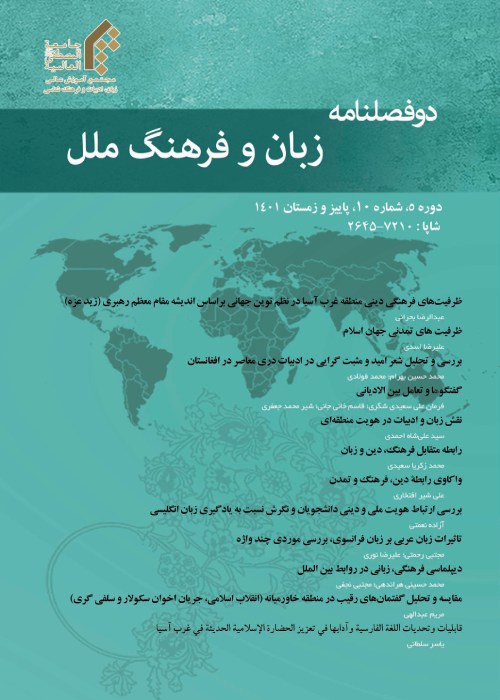فهرست مطالب
نشریه زبان و فرهنگ ملل
پیاپی 2 (پاییز و زمستان 1397)
- تاریخ انتشار: 1397/12/01
- تعداد عناوین: 6
-
Pages 11-27
Addressing the root-causes of conflict amongst people, peace practitioners attempted to present their peacebuilding models to build peace in a context of fighting individuals, groups and societies. Islamic faith-based peacebuilding derived from the main sources of Islamic thought - the Quran and Sunnah- is the model by which Muslim peacebuilders tried to solve the problems of the Muslim world. The outstanding icon of Islamic peacebuilding is Prophet Muhammad (S) as he is introduced to be a perfect role model for all humanity in any time. Therefore, we have a glance at the Prophet’s (S) tradition in order to illuminate how he behaved in a multi-cultural and multi-religious environment of Medina to build an integrated community. Dialogue was a tactic used by Prophet (S) in dealing with people by reciting the glorious Quran and issuing the Charter of Medina to unify the diverse society of Medina under a new culture of Muslim brotherhood and Ummah.
Keywords: İslam, The Quran, Faith-Based Peacebuilding, culture, Intercultural, Interfaith Dialogue, Prophet Muhammad (S), Medina Charter, Muslim Brotherhood -
Pages 29-42
In this article the idea of a contextual communication on the basis of a dialogical hermeneutics of cultures is introduced. To work contextually means to be open to the fact that different traditions appear on a scene with immanent terminologies, issues, and solutions as equal discoursive contributions from their individual perspective.
Keywords: culture, Contextual Communication, Dialogue, Hermeneutics, Tolerance, Geography of Thought -
Pages 43-62
By the spread and ownership of English in the new globalized arena, and by the great realization of World Englishes towards this miscellaneous geographical diffusion of English and local settings, a wide range of studies has been conducted to explore these new different varieties of English. Therefore, in today’s world, by huge communication and telecommunication infrastructures among global context, English as an International Language (EIL) has emerged its definition for the reason of international communication. In this scene, the great deal of western norms in contact with different local and cultural contexts, the term glocalization has emerged to compose globally appropriate norms by locally and culturally accepted settings. This paper introduces how these new challenging glocalized norms were maintained by western globalized forms in (ELT) pedagogy. As a result, it was the reason that in implication of glocalization in (ELT), by awareness of local needs and culturally acceptable norms, curriculum and syllabus designers have considered a new framework for developing their appropriate syllabi in terms of functional principles.
Keywords: Globalization, EFL, EIL, ELT, Syllabus design, Curriculum development -
Pages 63-75
Cultures are ways of connecting people together and are the essence of social life as they depict nations’ evolution and ancestry, shared values and traditions; and above all, they demonstrates the identity of a society. This brings the responsibility of how to react to competitions on cultural strategists and how imaginations are shaped. This study aims to shed light on the reasons why cultural activities revolve around some aspects, but neglect others and also to identify the reason behind unsuccessfulness of some cultural organizations in coping with cultural competition in an international level. It also offers solutions to dissolve the mentioned ineffectiveness of cultural strategies. Finally, some strategies to enhance re-imagination are suggested as well.
-
Pages 77-89
Religion plays a major role in the life of believing men and women. On many occasions, it has been used as a tool to achieve major personal as well as social objectives. One of the unmatched potentials possessed by religion as seen throughout history is its role in mobilizing masses for peace, reconciliation and also for destruction. There have been plenty of discussions and books written on the topic of comparative study in the field of theology, yet this article distinguishes itself in its effort to highlight the common social ethics in Islamic and Christian teachings in order to achieve a peaceful world. Islam and Christianity are of special importance to global peace as the adherents of these two religions constitute almost half of the people around the globe. The socio-ethical currents in the two divinely followed religions will be compared though descriptive methodology. It gives the followers of the respected religion a way forward in their interaction with each other. The result of such comparative study demonstrates the capacity embedded in these religions wherein a person can be a firm adherent to his/her belief yet be good to his/her neighbors or brethren in humanity.
Keywords: Social ethics in Islam, Social ethics in Christianity, Social Ethical currents -
Pages 91-106
L'une des grandes préoccupations de notre société en Iran d’aujourd'hui est les problèmes culturels liés à la langue. Ces préoccupations se présentent tellement profondes qu’elles se sont même parfois était le sujet de discussion dans le Ministère de l’éducation, par le Président de la République et même par le Guide Suprême de l’Iran. « La langue de la science n’est pas seulement l’anglais, d’autres langues comme l’espagnol, le français, l’allemand et les langues orientales sont également les langues parlées. L’identité indépendante est la première chose que nous devons cultiver chez les jeunes. ». Le point d’appui de ce sujet d’article relève du discours du Guide Suprême ; « identité indépendante ». Cet article est l’occasion donc de faire le point sur la représentation métalinguistique des sujets parlants dans lequel sera étudié dans un premier temps, le comportement linguistique des locuteurs persanophones en Iran vs les langues régionales en comparaison avec celui des locuteurs francophones en France vs les traces régionales. Ensuite seront développées les raisons derrière la création de la valorisation et de la dévalorisation des langues d’un pays d’après les idées d’André Martinet, des linguistes et des sociolinguistes en la matière.
Keywords: Valorisation et dévalorisation des langues, Identité indépendante, Comportement linguistique, Locuteur persanophone, Crise linguistique


